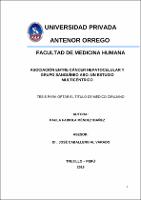Mostrar el registro sencillo del ítem
Asociación entre cáncer hepatocelular y grupo sanguíneo ABO: un estudio multicéntrico
| dc.contributor.advisor | Caballero Alvarado, José | |
| dc.contributor.author | Méndez Ibañez, Paula Fabiola | |
| dc.creator | Méndez Ibañez, Paula Fabiola | |
| dc.date.accessioned | 2018-04-13T13:24:21Z | |
| dc.date.available | 2018-04-13T13:24:21Z | |
| dc.date.issued | 2018 | |
| dc.identifier.uri | https://hdl.handle.net/20.500.12759/3987 | |
| dc.description.abstract | OBJETIVO: Determinar si existe asociación entre el carcinoma hepatocelular y el grupo sanguíneo ABO en pacientes atendidos en los Hospitales Belén, Hospital Víctor Lazarte Echegaray e Instituto Regional de Enfermedades Neoplásicas de Trujillo durante el periodo comprendido entre enero del 2005 a diciembre del 2015 MATERIAL Y MÉTODO: Se realizó un estudio casos y controles poblacional; el proceso de selección fue realizado bajo los criterios de inclusión y exclusión, teniendo como total de registrados a 1151 pacientes, pero por motivos de depuración, desaparecidos y repetidos sólo se consideraron 249 casos y 315 controles. RESULTADOS: En relación a la distribución de pacientes según grupo sanguíneo “O” y grupos de estudio; de los pacientes con Cáncer Hepatocelular (CHC) el 53.01 % tienen el grupo sanguíneo “O” con un ORc 0,28; IC 95% [0,19-0,41]; y el 35,74% tienen el grupo sanguíneo “A” con un ORc 4,06; IC 95% [2,65-6,21], ambos con un p= 0,001. También se realizó el análisis univariado de variables clínicas generales, resultando significativas el género masculino con un ORc 1,49; IC 95% [1,07-2,08] (p < 0,05) y el antecedente familiar de CHC (p < 0,001). Las variables como el VHB (50,48%), VHC (22,22%), alcoholismo (22,54%), Diabetes Mellitus (35,24%) y otros (23,17%) no resultaron ser significativas encontrándose en mayor número en los controles. CONCLUSIONES: Existe asociación entre el grupo sanguíneo ABO y cáncer hepatocelular, teniendo el grupo sanguíneo “A” cuatro veces más riesgo. Las variables con mayor significancia fueron el género masculino y antecedente familiar de cáncer hepatocelular. | es_PE |
| dc.description.abstract | OBJECTIVE: To determine if there is an association between hepatocellular carcinoma and the ABO blood group in patients treated at the Hospitales Belén, Hospital Víctor Lazarte Echegaray e Instituto Regional de Enfermedades Neoplásicas de Trujillo during the period from January 2005 to December 2015 MATERIAL AND METHODS: A population-based case-control study was conducted; the selection process was carried out under the inclusion and exclusion criteria, having as a total of 1151 patients registered, of which, for reasons such as depuration, missing and repeated, only recorded data were recorded in the clinical records of 249 and 315 for the cases and controls respectively. RESULTS: In relation to the distribution of patients according to blood group “O“ and study groups; of the patients with Hepatocellular Cancer (HCC) 53.01% have the blood group “O“ with a ORc IC 95% 0.28 [0.19-0.41]; and 35.74% have blood group “A“ with an ORc IC 95% 4.06 [2.65-6.21], both with p = 0.001.It was also done; the univariate analysis of the general characteristics of the study showed that the variables with the greatest significance (p <0.05) were the male gender with an ORc CI 95% 1.49 [1.07-2.08] and a family history of CHC with a p = 0.001. The variables such as HBV (50.48%), HCV (22.22%), alcoholism (22.54%), Diabetes Mellitus (35.24%) and others (23.17%) were not found to be significant. greater number in the controls. CONCLUSIONS: There is an association between the ABO blood group and hepatocellular cancer, with the blood group “A“ four times more risk. The variables with the greatest significance were the male gender and family history of hepatocellular cancer. | en_US |
| dc.description.uri | Tesis | es_PE |
| dc.format | application/pdf | es_PE |
| dc.language.iso | spa | es_PE |
| dc.publisher | Universidad Privada Antenor Orrego | es_PE |
| dc.relation.ispartofseries | T_MED.HUMA_2269 | |
| dc.rights | info:eu-repo/semantics/openAccess | es_PE |
| dc.rights.uri | https://creativecommons.org/licenses/by/4.0/ | es_PE |
| dc.source | Universidad Privada Antenor Orrego | es_PE |
| dc.source | Repositorio Institucional - UPAO | es_PE |
| dc.subject | Cáncer hepatocelular | es_PE |
| dc.subject | Grupo sanguíneo | es_PE |
| dc.subject | Factor de riesgo | es_PE |
| dc.title | Asociación entre cáncer hepatocelular y grupo sanguíneo ABO: un estudio multicéntrico | es_PE |
| dc.type | info:eu-repo/semantics/bachelorThesis | es_PE |
| thesis.degree.level | Título Profesional | es_PE |
| thesis.degree.grantor | Universidad Privada Antenor Orrego. Facultad de Medicina Humana | es_PE |
| thesis.degree.name | Médico Cirujano | es_PE |
| thesis.degree.discipline | Medicina Humana | es_PE |
| dc.subject.ocde | https://purl.org/pe-repo/ocde/ford#3.02.27 | es_PE |
| renati.type | https://purl.org/pe-repo/renati/type#tesis | es_PE |
| renati.level | https://purl.org/pe-repo/renati/level#tituloProfesional | es_PE |
| renati.discipline | 912016 | es_PE |
| dc.publisher.country | PE | es_PE |
Ficheros en el ítem
Este ítem aparece en la(s) siguiente(s) colección(es)
-
Medicina Humana [2969]


